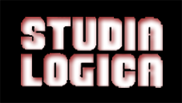

| Programme |
Friday, June 3 |
||
| Opening session Aula of the Polish Academy of Arts and Sciences, Sławkowska Str. 17, Kraków |
||
| 9:30 | Opening addresses: Jacek Malinowski, Studia Logica Editor-in-Chief Michał Heller, Director of the Copernicus Center Władysław Zuziak, Rector of the Pontifical Unversity of John Paul II Adam Olszewski, Chairman of the Organizing Committee |
|
| Plenary session: invited lectures Chairman: Michał Heller Aula of the Polish Academy of Arts and Sciences, Sławkowska Str. 17, Kraków |
||
| 10:00 | Stewart Shapiro, Open-texture, computability, and Church's Thesis | |
| 11:00 | Coffee break | |
| 11:20 | Marie Duží and Pavel Materna, Concepts and Church-Turing Thesis | |
| 12:20 | Jack Copeland, The Mathematical Objection: Turing, Gödel, and Penrose on the Mind | |
| 13:20 | Lunch break | |
| Afternoon sessions: contributed papers Pontifical University of John Paul II, Franciszkańska Str. 1, Kraków |
||
| Section A Chairman: Wilfried Sieg Room: 120 |
Section B Chairman: Oron Shagrir Room: 111 |
|
| 15:00 | Arnon Avron, A Logical Generalization of Church Thesis | Masaharu Mizumoto, Wittgenstein and Turing vs. Cantor |
| 15:45 | Benjamin Wells, Pseudorecursiveness and the Church-Turing Thesis | Jonathan Yaari, Justifying the Church-Turing Thesis: A Scientific Approach |
| 16:30 | Anatolij Dvurecenskij, State BL-Algebras and State-Morphism Algebras | Stanisław Krajewski, Is Church's Thesis unique? |
| 17:15 | Coffee break | |
| 17:30 | Wolfgang Degen, Church’s Thesis and Other Principles of Reducibility | Roberto Arpaia, Gödel's ideas on the limits of the Church-Turing's Thesis in philosophy of mind: some possible applications |
| 18:15 | Csaba Henk, Computability in terms of finitary witnesses | Bartosz Brożek and Adam Olszewski, Mathematical Subject and Church's Thesis |
Saturday, June 4 |
||
| Plenary session: invited lectures Chairman: David McCarty Aula of the Polish Academy of Arts and Sciences, Sławkowska Str. 17, Kraków |
||
| 9:00 | Ryszard Wójcicki, Accessibility of Truth; an Essay on Problems of Knowledge Formation | |
| 10:00 | Yuri Gurevich, What's an algorithm? | |
| 11:00 | Coffee break | |
| 11:20 | Wilfried Sieg, Gödel’s philosophical challenge (to Turing): “The human mind infinitely surpasses any finite machine.” | |
| 12:20 | Jan Woleński, On the Status of Church's Thesis | |
| 13:20 | Lunch break | |
| Afternoon sessions: contributed papers Pontifical University of John Paul II, Franciszkańska Str. 1, Kraków |
||
| Section A Chairman: Stewart Shapiro Room: 120 |
Section B Chairman: Jan Woleński Room: 111 |
|
| 15:30 | Nachum Dershowitz and Evgenia Falkovich, A Formalization and Proof of the Extended Church-Turing Thesis | Darren Abramson, Computation and the Mental: Church’s Thesis. ‘Right-to-left’ |
| 16:15 | Selmer Bringsjord and Naveen Sundar G., In Further Defense of the Unprovability of Church's Thesis | Marcin Miłkowski, How could we tell that the mind is a Turing machine? |
| 17:00 | Coffee break | |
| 17:15 | Paula Quinon, Computability on Strings | Marcin Schroeder, Mind, Meaning, and Computation: The Missing Link of Information Integration |
| 18:00 | Szymon Szymczak, Is the Church-Turing Thesis mathematically provable? | Paweł Grabarczyk, The Cognitive Criterion |
Sunday, June 5 |
||
| Plenary session: invited lectures Chairman: Jack Copeland Aula of the Polish Academy of Arts and Sciences, Sławkowska Str. 17, Kraków |
||
| 9:00 | David McCarty, Mathematical Realism and Church's Thesis | |
| 10:00 | Petr Hájek, Computational complexity, arithmetical hierarchy and mathematical fuzzy logic | |
| 11:00 | Coffee break | |
| 11:20 | Oron Shagrir, Who is the "human computer" in Turing's analysis of computability? | |
| 12:20 | Konrad Zdanowski, On intended models for arithmetic and intended notations | |
| 13:20 | Lunch break | |
| Afternoon sessions: contributed papers Pontifical University of John Paul II, Franciszkańska Str. 1, Kraków |
||
| Section A Chairman: Yuri Gurevich Room: 120 |
Section B Chairman: Pavel Materna Room: 111 |
|
| 15:00 | Paolo Gentilini, Discussing Church’s Thesis through evolutionary effective learning machines based on Constructive Paraconsistent Logic and Informational Logic | Rafal Urbaniak, How Not To Use the Church-Turing Thesis Against Platonism |
| 15:45 | Krzysztof Wójtowicz, Hypercomputation and Philosophy of Mathematics | Paolo Cotogno, Church’s Thesis: There Is No ‘Easy Half’ |
| 16:30 | Andrew Polonsky, Church’s Thesis and Computable Processes | Kim Solin, Are epistemological aspects of computability theory paid enough attention to? |
| 17:15 | Coffee break | |
| 17:40 | Closing session The conclusion of the conference, Ryszard Wójcicki Room: 120 |
|



